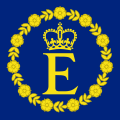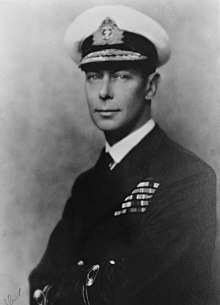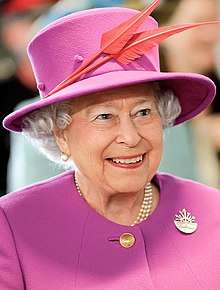Head of the Commonwealth
The Head of the Commonwealth is the "symbol of the free association of independent member nations" of the Commonwealth of Nations (commonly known as the Commonwealth), an intergovernmental organisation that currently comprises 54 sovereign states. There is no set term of office or term limit and the role itself involves no part in the day-to-day governance of any of the member states within the Commonwealth.
| Head of the Commonwealth | |
|---|---|
 Personal flag of Queen Elizabeth II | |
| Style | Her Majesty |
| Term length | Life |
| Inaugural holder | George VI |
| Website | thecommonwealth.org |
By 1949, the British Commonwealth was a group of eight countries, each having George VI as king. India, however, desired to become a republic, but not to leave the Commonwealth by doing so. This was accommodated by the creation of the title Head of the Commonwealth for the King, and India became a republic in 1950. Subsequently, many other nations including Pakistan, Sri Lanka, Ghana and Singapore ceased to recognise the monarch of the United Kingdom as their respective head of state, but as members of the Commonwealth of Nations recognised the British monarch as Head of the Commonwealth.[1]
The title is currently held by Queen Elizabeth II, George VI's eldest daughter. Charles, Prince of Wales, was appointed her designated successor at the 2018 Commonwealth Heads of Government Meeting.
Title
The title was devised in the London Declaration as a result of discussions at the 1949 Commonwealth Prime Ministers' Conference.[2] It is rendered in Latin as Consortionis Populorum Princeps.[3]
Position
The Head of the Commonwealth, currently Queen Elizabeth II, is recognised by the members of the Commonwealth of Nations as the "symbol of their free association" and serves as a leader, alongside the Commonwealth Secretary-General and Commonwealth Chair-in-Office. The Head of the Commonwealth does not, though, have any role in the governance of any Commonwealth state; Elizabeth's positions as monarch of each of the 16 Commonwealth realms are separate from that of Head of the Commonwealth.
The Head of the Commonwealth or a representative (such as Charles, Prince of Wales) attends the biennial Commonwealth Heads of Government Meeting (CHOGM), held at locations throughout the Commonwealth. This is a tradition begun by the monarch on the advice of Canadian Prime Minister Pierre Trudeau in 1973,[4] when the CHOGM was first held in Canada. During the summit, the Head of the Commonwealth has a series of private meetings with Commonwealth countries' leaders, attends a CHOGM reception and dinner, and makes a general speech. The Queen or a representative is also present at the quadrennial Commonwealth Games and on every Commonwealth Day, the second Monday in March, broadcasts a message to all member countries.
History
In 1949, King George VI was king of each of the countries that then comprised the British Commonwealth (later the Commonwealth of Nations): the United Kingdom, Canada, Australia, New Zealand, South Africa, India, Pakistan, and Ceylon. However, the Indian Cabinet desired the country to become a republic, but not to leave the Commonwealth as a consequence of no longer having George VI as king, as happened to Ireland. To accommodate this, the London Declaration, devised by Canadian prime minister Louis St. Laurent, stated that the King, as the symbol of the free association of the countries of the Commonwealth, was the Head of the Commonwealth.[5] When India adopted a republican constitution on 26 January 1950, George VI ceased to be its monarch (the President of India, Rajendra Prasad, became head of state), but it did regard him as Head of the Commonwealth.
Elizabeth II became Head of the Commonwealth on her accession in 1952, stating at the time, "[t]he Commonwealth bears no resemblance to the empires of the past. It is an entirely new conception built on the highest qualities of the spirit of man: friendship, loyalty, and the desire for freedom and peace."[6] The following year, a Royal Style and Titles Act was passed in each of the Commonwealth realms, adding for the first time the term Head of the Commonwealth to the monarch's titles.
In December 1960, the Queen had a personal flag created to symbolise her as Head of the Commonwealth and not associated with her role as queen of any particular country. Over time, the flag has replaced the British Royal Standard when the Queen visits Commonwealth countries of which she is not head of state (and thus does not possess a unique royal standard for that state) and on Commonwealth occasions in the United Kingdom. When the Queen visits the headquarters of the Commonwealth Secretariat in London, this personal standard—not any of her royal standards—is raised.[7]
Former Canadian Prime Minister Brian Mulroney said Elizabeth was a "behind the scenes force" in ending apartheid in South Africa.[8][9]
Succession
By 2018, with the Queen in her 90s, and the position of "Head of the Commonwealth" not technically hereditary, talks as to whether or not Prince Charles or someone else should become the third person to hold it had been going on for some time.[10] The London Declaration states that "The King [acts] as the symbol of the free association of its independent member nations and as such the Head of the Commonwealth", whereby both republics and kingdoms that are not Commonwealth realms can recognise the monarch as Head of the Commonwealth without accepting the person as the country's head of state. However, though each Commonwealth realm's laws on royal titles and styles make Head of the Commonwealth part of the reigning monarch's full title, and Queen Elizabeth II declared in 1958, through the Letters Patent creating her son, Prince Charles, as Prince of Wales, that Charles and his heirs and successors shall be future Heads of the Commonwealth,[11] there have been conflicting statements on how successors to the position of Head of the Commonwealth are chosen. The Commonwealth Secretariat asserts any successor will be chosen collectively by the Commonwealth heads of government.[12] Commonwealth heads of government, such as the then Canadian Prime Minister Stephen Harper, had already referred to Prince Charles as "the future head of the Commonwealth",[13] and in 2015 the then Prime Minister of New Zealand John Key said, "The title [of Head of the Commonwealth] should just go with the Crown".[14]
Commentators in British newspapers discussed whether it should be a one-off decision to elect Prince Charles to the Headship, whether the British monarch should automatically become head of the Commonwealth, or whether the post should be elected or chosen by consensus.[15][16][17] There was also speculation that a rotating ceremonial "republican" headship might be instituted.[18][19] The Daily Telegraph reported that "the post is not hereditary and many leaders want an elected head to make the organisation more democratic."[20]
In 2018, following the 2018 Commonwealth Heads of Government Meeting, Commonwealth leaders officially declared that Charles would be the next Head of the Commonwealth.[21][22][23][24]
List
| Name | Portrait | Birth | Death | Start | End |
|---|---|---|---|---|---|
| George VI |  |
14 December 1895 | 6 February 1952 | 28 April 1949[n 1] | 6 February 1952 |
| Elizabeth II | _(cropped).jpg) |
21 April 1926 | Living | 6 February 1952[n 2] | Incumbent |
See also
- Timeline of the Commonwealth of Nations
- List of titles and honours of King George VI
- List of titles and honours of Queen Elizabeth II
- Style of the British sovereign
- Title and style of the Canadian monarch
Notes
- Based on the London Declaration and does not match his accession as king on 11 December 1936.
- Date of Elizabeth II's accession as Queen.
Footnotes
- "About the commonwealth". www.gov.uk. The Foreign and Commonwealth office, UK. Retrieved 12 January 2018.
- London Declaration 1949 (PDF), Commonwealth Secretariat, archived from the original (PDF) on 27 September 2012, retrieved 2 April 2013
- "Biography of Elizabeth II (UK)". archontology.org.
- Heinricks, Geoff (2001), "Trudeau and the monarchy; National Post", Canadian Monarchist News, Winter/Spring 2000–2001, Toronto: Monarchist League of Canada, retrieved 26 February 2010
- London Declaration (PDF), Commonwealth Secretariat, 1949, archived from the original (PDF) on 27 September 2012, retrieved 29 July 2013
- "Head of the Commonwealth". Commonwealth Secretariat. Archived from the original on 31 March 2012. Retrieved 23 March 2009.
- "Mailbox". Royal Insight. September 2006. p. 3. Archived from the original on 19 November 2008.
- Geddes, John (2012). "The day she descended into the fray". Maclean's (Special Commemorative Edition: The Diamond Jubilee: Celebrating 60 Remarkable years ed.): 72.
- MacQueen, Ken; Treble, Patricia (2012). "The Jewel in the Crown". Maclean's (Special Commemorative Edition: The Diamond Jubilee: Celebrating 60 Remarkable years ed.): 43–44.
- Landale, James (13 February 2018). "Commonwealth in secret succession plans". BBC News – via www.bbc.com.
- Elizabeth II, Letters Patent creating Prince Charles Prince of Wales and Earl of Chester, 1958 (PDF), Queen's Printer, retrieved 3 June 2014
- FAQs, The Commonwealth, retrieved 18 December 2013
- Statement by the Prime Minister of Canada on Commonwealth Day, Prime Minister of Canada, 10 March 2014, archived from the original on 7 April 2014, retrieved 4 April 2014
- "Charles wins support to head Commonwealth". New Zealand Herald. 28 November 2015. Retrieved 28 November 2015.
- Mount, Harry (13 February 2018). "After seven decades of slogging around the globe, doesn't Prince Charles deserve to lead the Commonwealth?". The Telegraph – via www.telegraph.co.uk.
- Mohabir, Nalini (15 February 2018). "The next head of the Commonwealth must not be a royal from Brexit Britain - Nalini Mohabir". The Guardian.
- Palmer, Richard (13 February 2018). "Prince Charles 'might NOT be next head of Commonwealth if the Queen dies'".
- Perring, Rebecca (13 February 2018). "'Disastrous consequences!' Anger at talks to block Charles' role as Head of Commonwealth".
- "What Prince Charles should say to the Commonwealth - Coffee House". 18 February 2018.
- Rayner, Gordon (27 November 2015). "State visit to Malta: Queen hints to sceptical leaders that Prince should be next Head of the Commonwealth". telegraph.co.uk.
- "Prince Charles to be next Commonwealth head". BBC News. 20 April 2018. Retrieved 20 April 2018.
- "Commonwealth Heads of Government Meeting 2018 - Leaders' Statement". The Commonwealth. The Commonwealth of Nations. 21 April 2018. Retrieved 21 April 2018.
We recognise the role of The Queen in championing the Commonwealth and its peoples. The next Head of the Commonwealth shall be His Royal Highness Prince Charles, The Prince of Wales.
- "Charles 'to be next Commonwealth head'". BBC News. 20 April 2018. Retrieved 20 April 2018.
- "Prince Charles to succeed Queen as Commonwealth head". Sky News. 20 April 2018. Retrieved 20 April 2018.
